标签:hello 依赖 ica asc splay 类的方法 corn 实验 red
第一部分 理论部分
1.(1) 用户界面(User Interface)用户与计算机系统(各种程序)交互的接口
(2)图形用户界面(Graphical User Interface)以图形方式呈现的用户界面
2.AWT:Java 的抽象窗口工具箱( Abstract WindowToolkit, AWT)包含在java.awt包中,它提供了许多用来设计GUI的组件类和容器类。
. AWT库处理用户界面元素的方法:把图形元素的创建和行为委托给本地GUI工具箱进行处理。
. 应用AWT编写依赖于本地用户界面元素GUI会暴露出一些缺陷。例如,菜单、滚动条和文本域这些
用户界面元素,在不同的平台上,操作行为上存在一些微妙的差异。
3.Swing:
Swing用户界面库是非基于对等体的GUI工具箱。
? Swing具有更丰富并且更方便的用户界面元素集合。
? Swing对底层平台的依赖很少,因此与平台相关的bug很少。
? Swing会带来交叉平台上的统一视觉体验。
? Swing类库被放在javax.swing包里。
4.AWT与Swing的关系
大部分AWT组件都有其Swing的等价组件。
? Swing组件的名字一般是在AWT组件名前面添加一个字母“J”,如:JButton,JFrame,JPanel等。
二..创建框架
1.组件:构成图形用户界面的元素,拿来即用用图形表示(能在屏幕上显示,能和用户进行交互)
2.通常把由Component类的子类或间接子类创建的对象称为一个组件。
3.容器:容器是Java中能容纳和排列组件的组件。常用的容器是框架(Frame,JFrame)
例:Frame fra = new Frame(“这是一个窗口”);
4.添加组件:
Container类提供了一个方法add(),用来在容器类组件对象中添加其他组件。
容器本身也是一个组件,可以把一个容器添加到另一个容器里,实现容器嵌套。
5.框架(Frame)的创建:
(1)创建空框架:在Java中,常采用框架(Frame)创建初始界面,即GUI的顶层窗口。
? AWT库中有一个基于对等体的Frame类。该类的Swing版本为JFrame,JFrame是Frame子类。
(2)框架定位与框架属性:
定位:
—常用Component类的setLocation和setBounds方法
常用属性
—Title:框架标题
—IconImage:框架图标
(3)确定框架的大小:通过调用Toolkit类的方法来得到屏幕尺寸信息
6.在组件中显示信息
在AWT中可调用add()方法把组件直接添加到AWTFrame中,在Swing中组件则添加到内容窗格里。
其中内容窗格是用来添加组件的,添加代码如下:
Container contentPane = getContentPane();
Component c=…;contentPane.add(c);. 用户也可以自行创建一个组件类,并在组件上进行绘制,此时需要重载paintComponent()。
用户的自建组件也可添加到内容窗格里。
. paintComponent(Graphics g)定义在JComponent类中,该方法在窗口需要重新绘图时(如扩大窗口或极小化窗口),被系统自动调用
.. paintComponent()方法被调用时,系统就自动产生一个Graphics类型的参数,传递给paintComponent方法中的参数g。
组件的激活与可见性:
public void setEnabled(boolean b):设置组件是否可被激活。
当参数b取值true时,组件可以被激活。
当参数b取值false 时,组件不可激活。
默认情况下,组件是可以被激活的。
public void setVisible(boolean b):设置组件在该容器中的可见性。
当b取值true时,组件在容器中可见。
当b取值false时,组件在容器中不可见。
除了Window型组件外,其它类型组件默认是可见的。
第二部分 实验部分
1、实验目的与要求
(1) 掌握Java GUI中框架创建及属性设置中常用类的API;
(2) 掌握Java GUI中2D图形绘制常用类的API;
(3) 了解Java GUI中2D图形中字体与颜色的设置方法;
(4) 了解Java GUI中2D图像的载入方法。
2、实验内容和步骤
实验1: 导入第10章示例程序,测试程序并进行代码注释。
测试程序1:
l 运行下列程序,观察程序运行结果。
|
import javax.swing.*; public class SimpleFrameTest { public static void main(String[] args) { JFrame frame = new JFrame(); frame.setBounds(0, 0,300, 200); frame.setDefaultCloseOperation(JFrame.EXIT_ON_CLOSE); frame.setVisible(true); } } |
测试结果如下所示
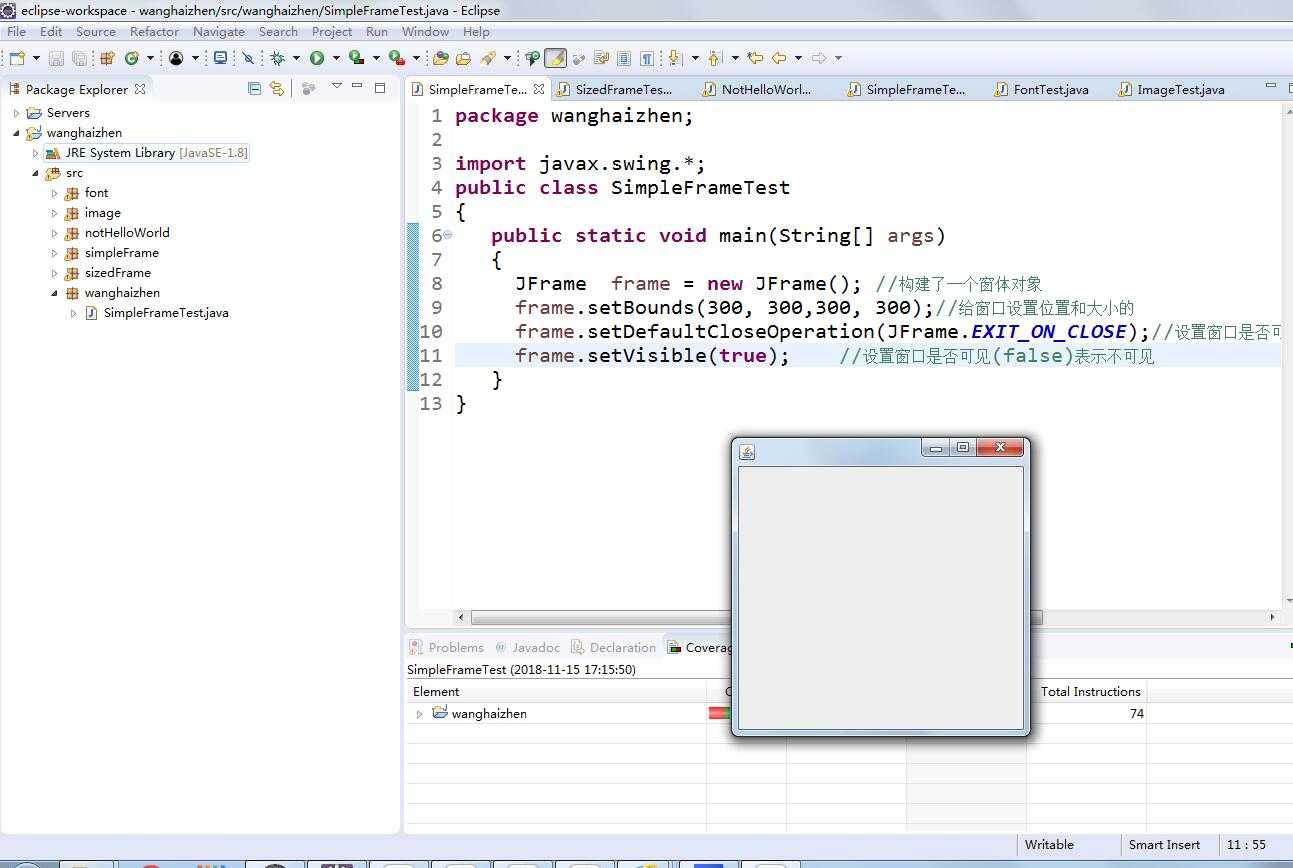
l 在elipse IDE中调试运行教材407页程序10-1,结合程序运行结果理解程序;与上面程序对比,思考异同;
l 掌握空框架创建方法;
l 了解主线程与事件分派线程概念;
l 掌握GUI顶层窗口创建技术。
package simpleFrame;
import java.awt.*;
import javax.swing.*;
/**
* @version 1.33 2015-05-12
* @author Cay Horstmann
*/
public class SimpleFrameTest
{
public static void main(String[] args)
{
EventQueue.invokeLater(() ->
{
SimpleFrame frame = new SimpleFrame();
frame.setDefaultCloseOperation(JFrame.EXIT_ON_CLOSE);//设置窗口是否可控
frame.setVisible(true);//设置窗口是否可见
});
}
}
class SimpleFrame extends JFrame
{
private static final int DEFAULT_WIDTH = 300;
private static final int DEFAULT_HEIGHT = 200;
public SimpleFrame()
{
setSize(DEFAULT_WIDTH, DEFAULT_HEIGHT);
}
}
测试结果如下所示
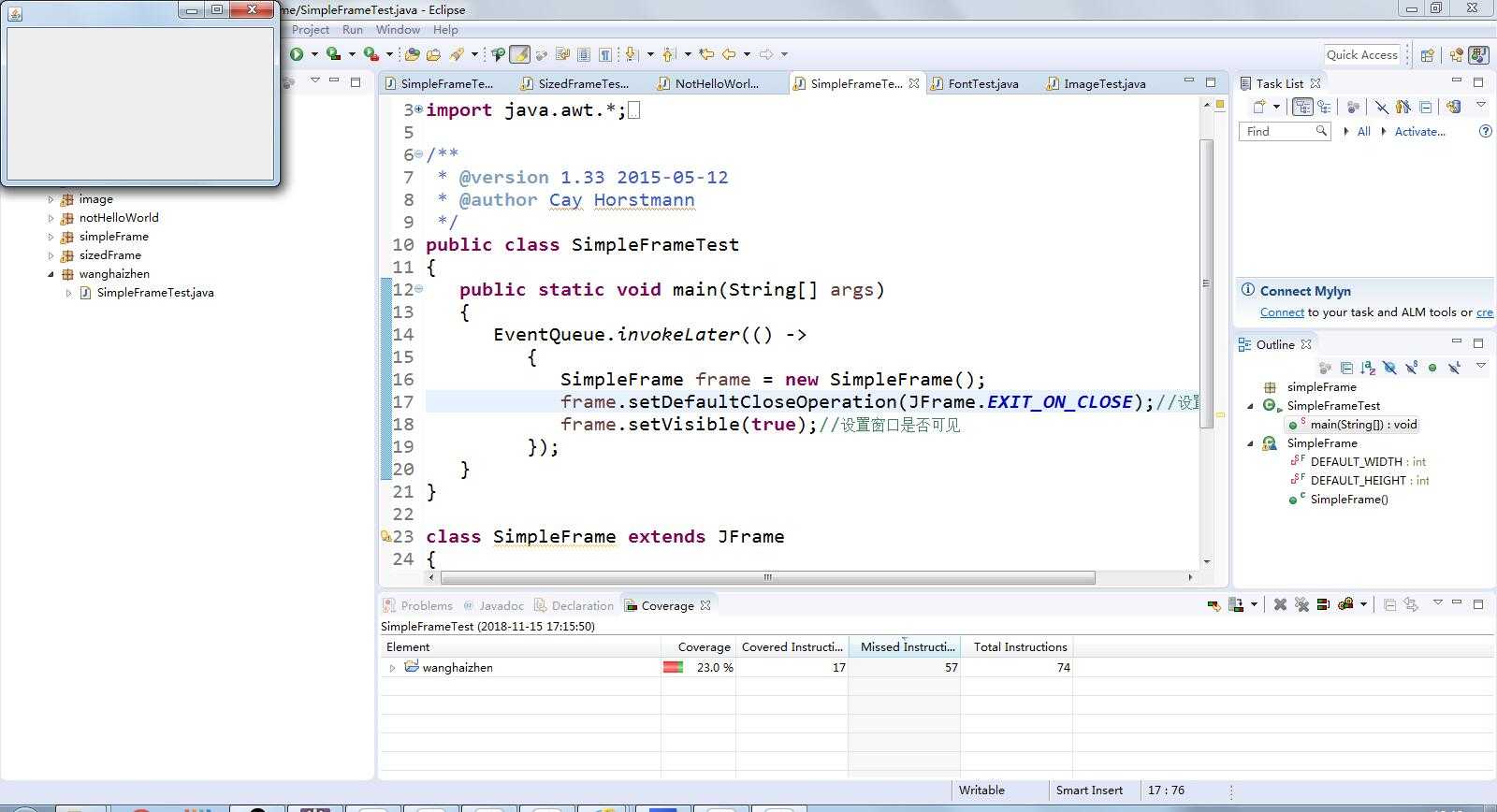
测试程序2:
l 在elipse IDE中调试运行教材412页程序10-2,结合程序运行结果理解程序;
l 掌握确定框架常用属性的设置方法。
package sizedFrame;
import java.awt.*;
import javax.swing.*;
/**
* @version 1.34 2015-06-16
* @author Cay Horstmann
*/
public class SizedFrameTest
{
public static void main(String[] args)
{
EventQueue.invokeLater(() ->
{
JFrame frame = new SizedFrame();
frame.setTitle("SizedFrame");//设置窗口的尺寸
frame.setDefaultCloseOperation(JFrame.EXIT_ON_CLOSE);//设置窗口是否可控
frame.setVisible(true);//控制窗口是否可见
});
}
}
class SizedFrame extends JFrame
{
public SizedFrame()
{
// get screen dimensions
//获取屏幕尺寸
Toolkit kit = Toolkit.getDefaultToolkit();
Dimension screenSize = kit.getScreenSize();//获取屏幕的大小
int screenHeight = screenSize.height;//屏幕的尺寸高度
int screenWidth = screenSize.width;//屏幕的尺寸宽度
// set frame width, height and let platform pick screen location
//设置框架 宽度,高度,病并让平台拾取屏幕位置
setSize(screenWidth / 2, screenHeight / 2);//调整组件的大小,宽width,高为height
setLocationByPlatform(true);//控制窗口是否可见
// set frame icon
//设置框架图标
Image img = new ImageIcon("icon.gif").getImage();//返回图标
setIconImage(img);//设置要作为此窗口图标显示的图像。
}
}
测试结果如下所示
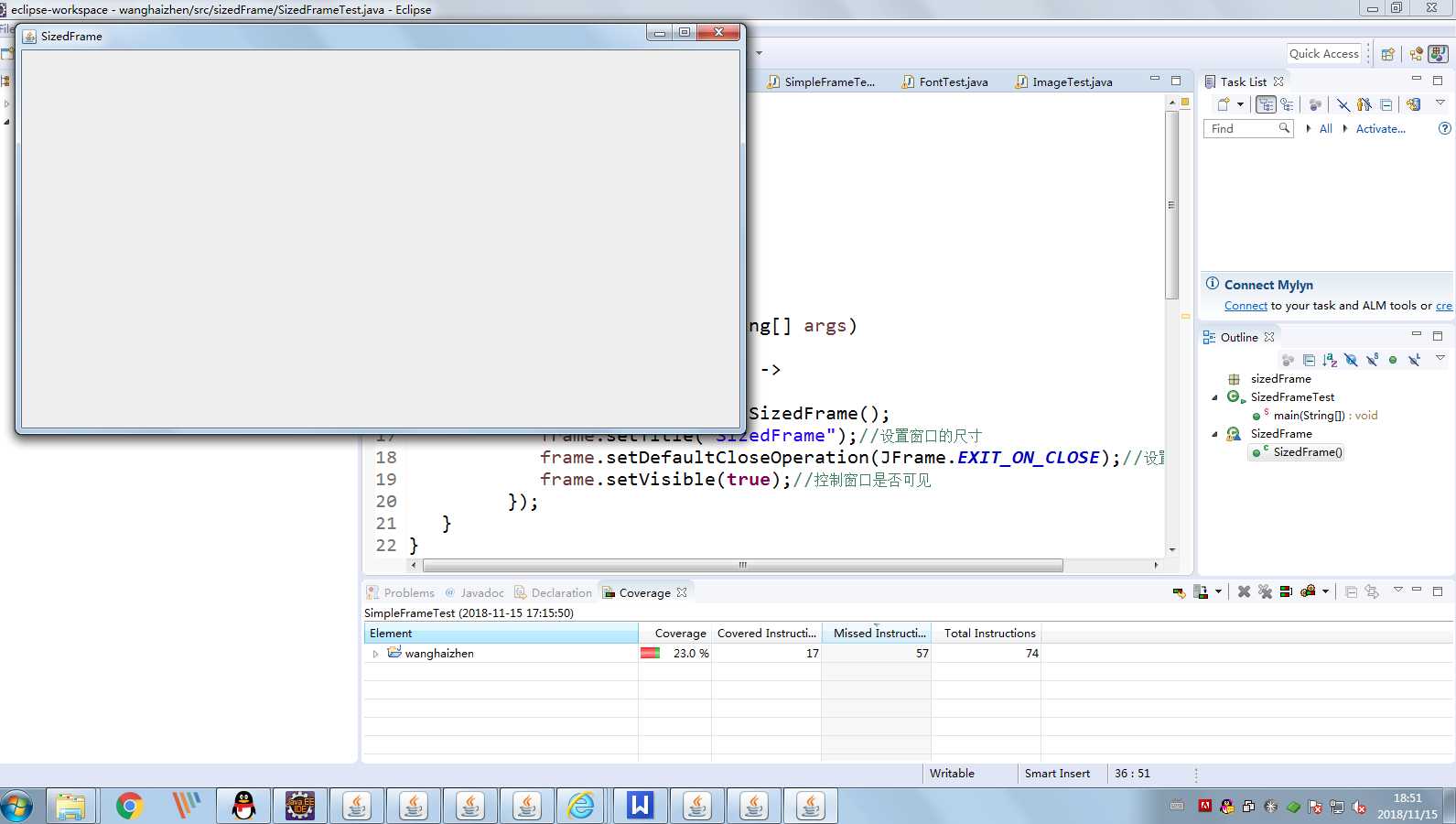
测试程序3:
l 在elipse IDE中调试运行教材418页程序10-3,结合运行结果理解程序;
l 掌握在框架中添加组件;
l 掌握自定义组件的用法。
package notHelloWorld;
import javax.swing.*;
import java.awt.*;
/**
* @version 1.33 2015-05-12
* @author Cay Horstmann
*/
public class NotHelloWorld
{
public static void main(String[] args)
{
EventQueue.invokeLater(() ->
{
JFrame frame = new NotHelloWorldFrame();
frame.setTitle("NotHelloWorld");//将此窗体的标题设置为指定的字符串。
frame.setDefaultCloseOperation(JFrame.EXIT_ON_CLOSE);//设置窗口是否可控
frame.setVisible(true);
});
}
}
/**
* A frame that contains a message panel
* 包含消息面板的帧
*/
class NotHelloWorldFrame extends JFrame
{
public NotHelloWorldFrame()
{
add(new NotHelloWorldComponent());
pack();
}
}
/**
* A component that displays a message.//显示消息的组件
*/
class NotHelloWorldComponent extends JComponent
{
public static final int MESSAGE_X = 75;
public static final int MESSAGE_Y = 100;
private static final int DEFAULT_WIDTH = 300;
private static final int DEFAULT_HEIGHT = 200;
public void paintComponent(Graphics g)
{
g.drawString("Not a Hello, World program", MESSAGE_X, MESSAGE_Y);
}
public Dimension getPreferredSize() { return new Dimension(DEFAULT_WIDTH, DEFAULT_HEIGHT); }
}
测试结果如下所示
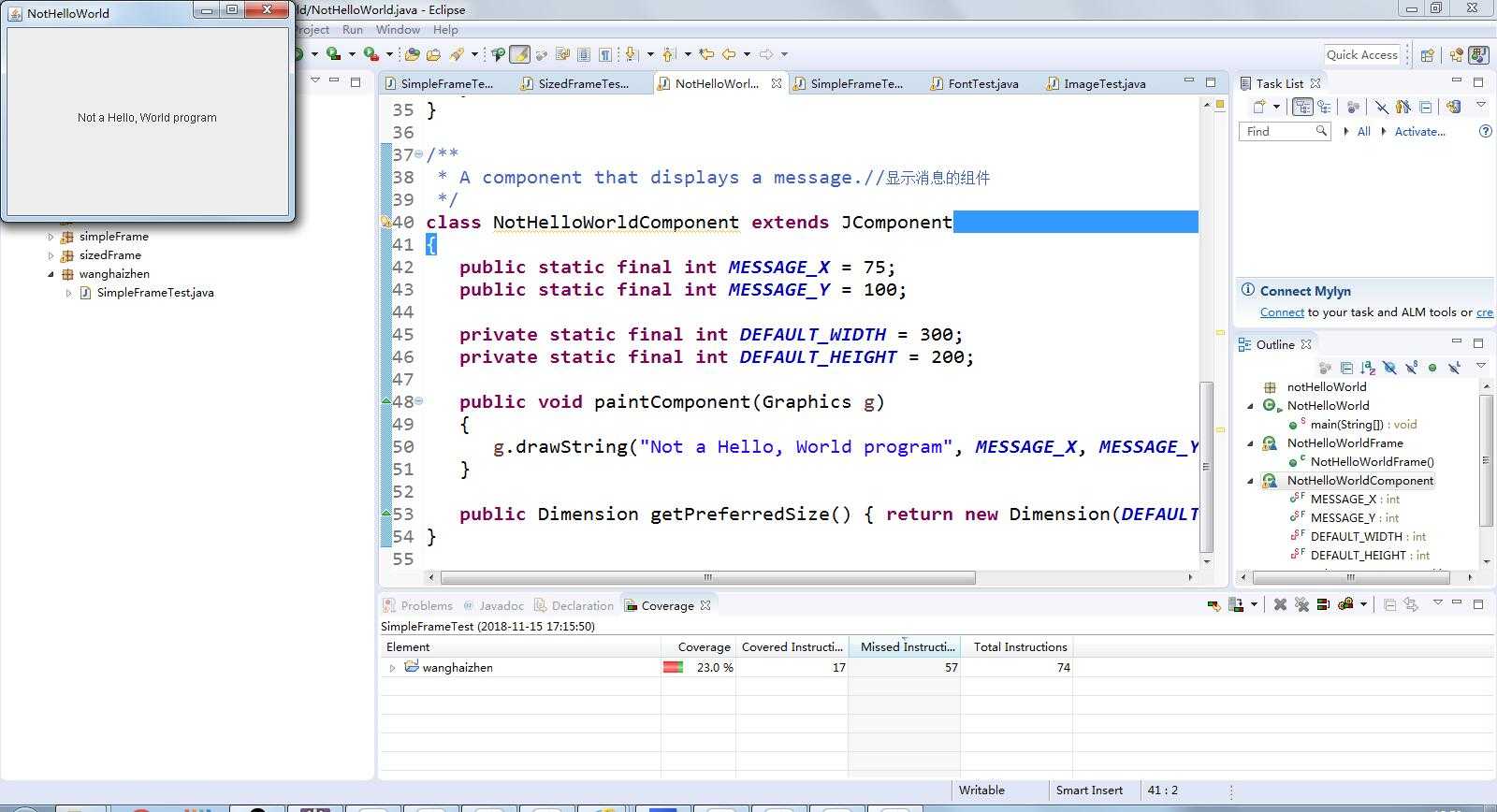
测试程序4:
l 在elipse IDE中调试运行教材424 -425页程序10-4,结合程序运行结果理解程序;
l 掌握2D图形的绘制方法。
package draw;
import java.awt.*;
import java.awt.geom.*;
import javax.swing.*;
/**
* @version 1.33 2007-05-12
* @author Cay Horstmann
*/
public class DrawTest
{
public static void main(String[] args)
{
EventQueue.invokeLater(() ->
{
JFrame frame = new DrawFrame();
frame.setTitle("DrawTest");
frame.setDefaultCloseOperation(JFrame.EXIT_ON_CLOSE);
frame.setVisible(true);
});
}
}
/**
* A frame that contains a panel with drawings
*/
class DrawFrame extends JFrame
{
public DrawFrame()
{
add(new DrawComponent());
pack();
}
}
/**
* A component that displays rectangles and ellipses.
*/
class DrawComponent extends JComponent
{
private static final int DEFAULT_WIDTH = 400;
private static final int DEFAULT_HEIGHT = 400;
public void paintComponent(Graphics g)
{
Graphics2D g2 = (Graphics2D) g;
// draw a rectangle
double leftX = 100;
double topY = 100;
double width = 200;
double height = 150;
Rectangle2D rect = new Rectangle2D.Double(leftX, topY, width, height);
g2.draw(rect);
// draw the enclosed ellipse
Ellipse2D ellipse = new Ellipse2D.Double();
ellipse.setFrame(rect);
g2.draw(ellipse);
// draw a diagonal line
g2.draw(new Line2D.Double(leftX, topY, leftX + width, topY + height));
// draw a circle with the same center
double centerX = rect.getCenterX();
double centerY = rect.getCenterY();
double radius = 150;
Ellipse2D circle = new Ellipse2D.Double();
circle.setFrameFromCenter(centerX, centerY, centerX + radius, centerY + radius);
g2.draw(circle);
}
public Dimension getPreferredSize() { return new Dimension(DEFAULT_WIDTH, DEFAULT_HEIGHT); }
}
测试结果如下所示
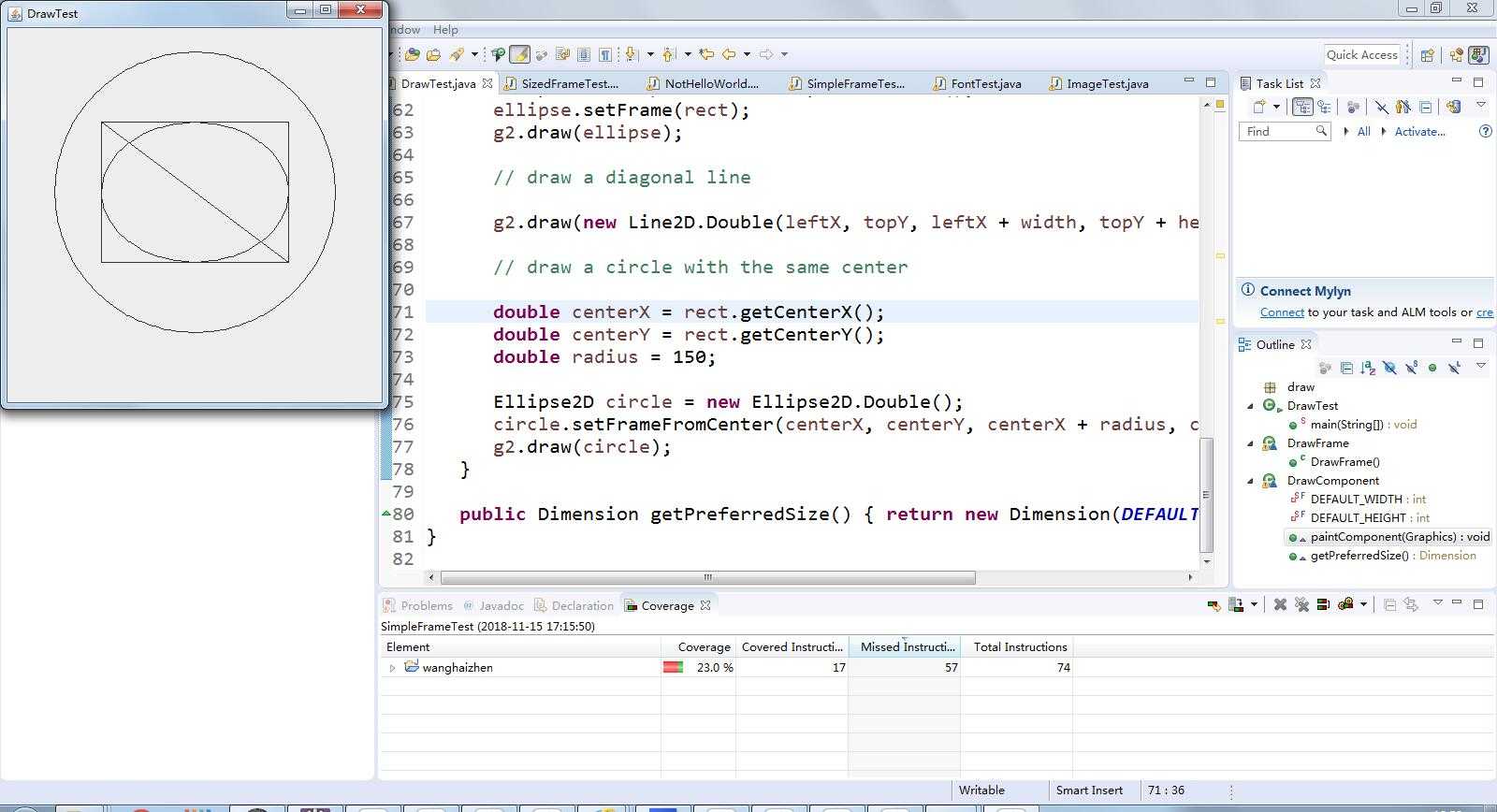
测试程序5:
l 在elipse IDE中调试运行教材432页-433程序10-5,结合程序运行结果理解程序;
l 了解2D图形中字体的设置的方法;
package font;
import java.awt.*;
import java.awt.font.*;
import java.awt.geom.*;
import javax.swing.*;
/**
* @version 1.34 2015-05-12
* @author Cay Horstmann
*/
public class FontTest
{
public static void main(String[] args)
{
EventQueue.invokeLater(() ->
{
JFrame frame = new FontFrame();
frame.setTitle("FontTest");//将此窗体的标题设置为指定的字符串。
frame.setDefaultCloseOperation(JFrame.EXIT_ON_CLOSE);//将窗口设置为可控的
frame.setVisible(true);//设置窗口是否可见
});
}
}
/**
* A frame with a text message component//带有文本消息组建的框架
*/
class FontFrame extends JFrame
{
public FontFrame()
{
add(new FontComponent());
pack();
}
}
/**
* A component that shows a centered message in a box.
*/
class FontComponent extends JComponent
//定义了两个常量
{
private static final int DEFAULT_WIDTH = 300;
private static final int DEFAULT_HEIGHT = 200;
public void paintComponent(Graphics g)
{
Graphics2D g2 = (Graphics2D) g;
String message = "Hello, World!";//定义有一个字符串
//用图形的方式将Hello,World!在组件中画出来
Font f = new Font("Serif", Font.BOLD, 36);
g2.setFont(f);
// measure the size of the message
//测量消息的大小
FontRenderContext context = g2.getFontRenderContext();
Rectangle2D bounds = f.getStringBounds(message, context);
// set (x,y) = top left corner of text
//设置(X,y) = 文本左上角
double x = (getWidth() - bounds.getWidth()) / 2;
double y = (getHeight() - bounds.getHeight()) / 2;
// add ascent to y to reach the baseline
//增加上升到y以达到基线
double ascent = -bounds.getY();
double baseY = y + ascent;
// draw the message
//画出消息
g2.drawString(message, (int) x, (int) baseY);
g2.setPaint(Color.LIGHT_GRAY);
// draw the baseline
//画出基线
g2.draw(new Line2D.Double(x, baseY, x + bounds.getWidth(), baseY));
// draw the enclosing rectangle
//绘制包围的矩形
Rectangle2D rect = new Rectangle2D.Double(x, y, bounds.getWidth(), bounds.getHeight());
g2.draw(rect);
}
public Dimension getPreferredSize() { return new Dimension(DEFAULT_WIDTH, DEFAULT_HEIGHT); }
}
测试结果如下所示
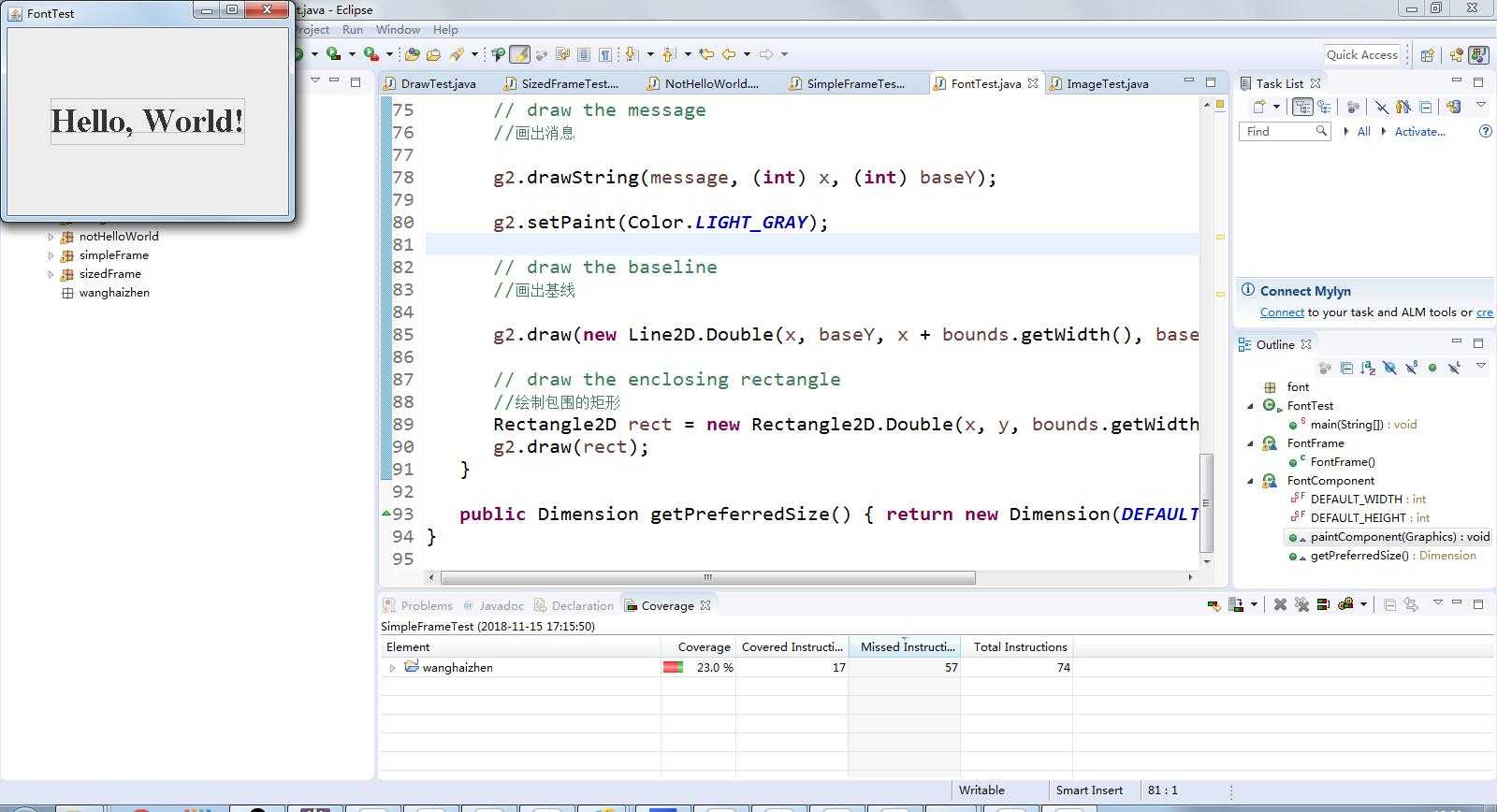
测试程序6:
l 在elipse IDE中调试运行教材436页-437程序10-6,结合程序运行结果理解程序;
l 了解2D图形图像的显示方法。
package image;
import java.awt.*;
import javax.swing.*;
/**
* @version 1.34 2015-05-12
* @author Cay Horstmann
*/
public class ImageTest
{
public static void main(String[] args)
{
EventQueue.invokeLater(() ->
{
JFrame frame = new ImageFrame();
frame.setTitle("ImageTest");
frame.setDefaultCloseOperation(JFrame.DO_NOTHING_ON_CLOSE);
frame.setVisible(true);
});
}
}
/**
* A frame with an image component
*/
class ImageFrame extends JFrame
{
public ImageFrame()
{
add(new ImageComponent());
pack();
}
}
/**
* A component that displays a tiled image
*/
class ImageComponent extends JComponent
{
private static final int DEFAULT_WIDTH = 300;
private static final int DEFAULT_HEIGHT = 200;
private Image image;
public ImageComponent()
{
image = new ImageIcon("blue-ball.gif").getImage();
}
public void paintComponent(Graphics g)
{
if (image == null) return;
int imageWidth = image.getWidth(null);//定义图像的高度
int imageHeight = image.getHeight(null);//定义图像的宽度
// draw the image in the upper-left corner
//在左上角绘制图像
g.drawImage(image, 0, 0, null);
// tile the image across the component
//将图像平铺在组件上
for (int i = 0; i * imageWidth <= getWidth(); i++)
for (int j = 0; j * imageHeight <= getHeight(); j++)
if (i + j > 0)
g.copyArea(0, 0, imageWidth, imageHeight, i * imageWidth, j * imageHeight);
}
public Dimension getPreferredSize() { return new Dimension(DEFAULT_WIDTH, DEFAULT_HEIGHT); }
}
测试结果如下所示
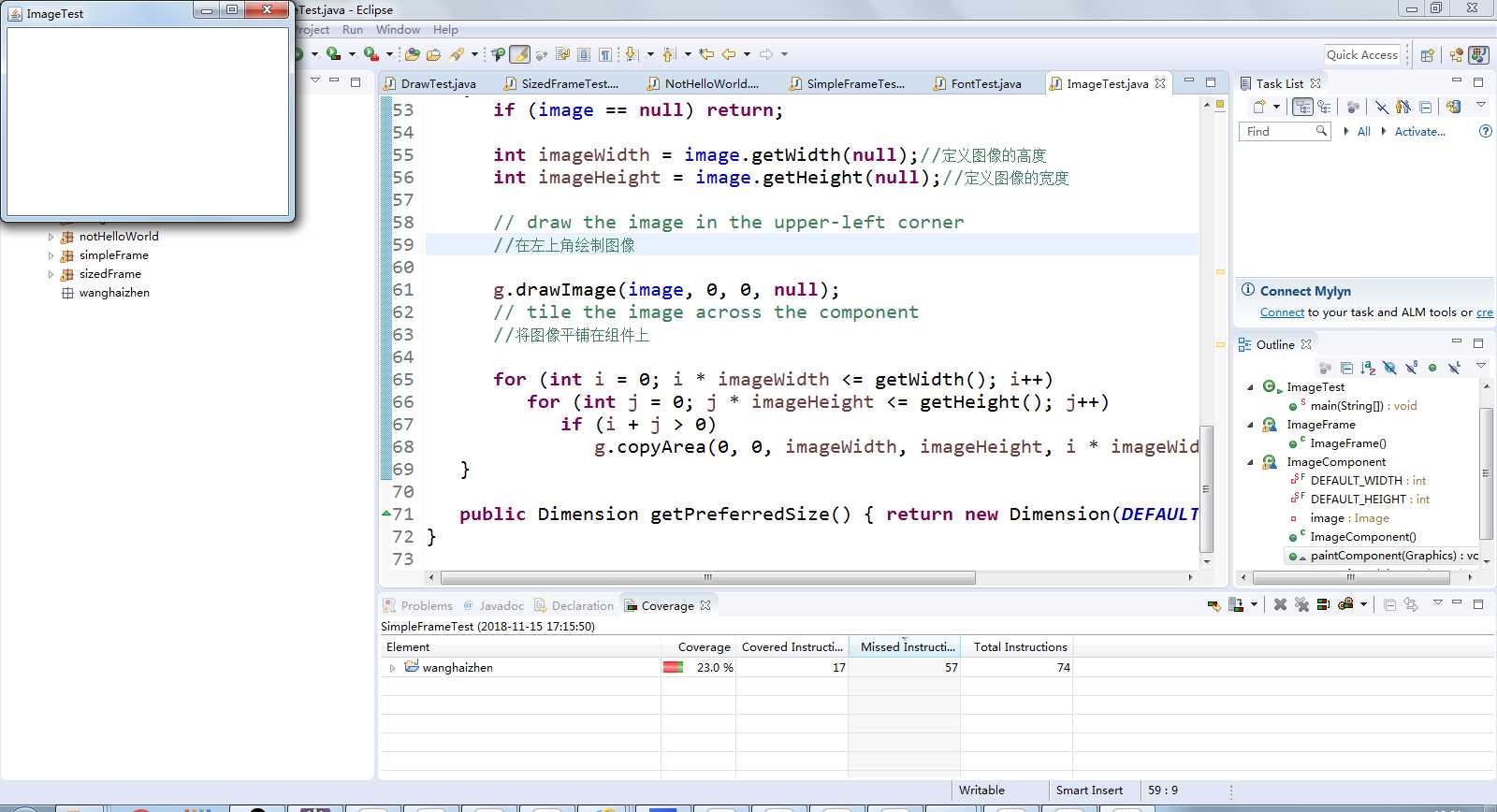
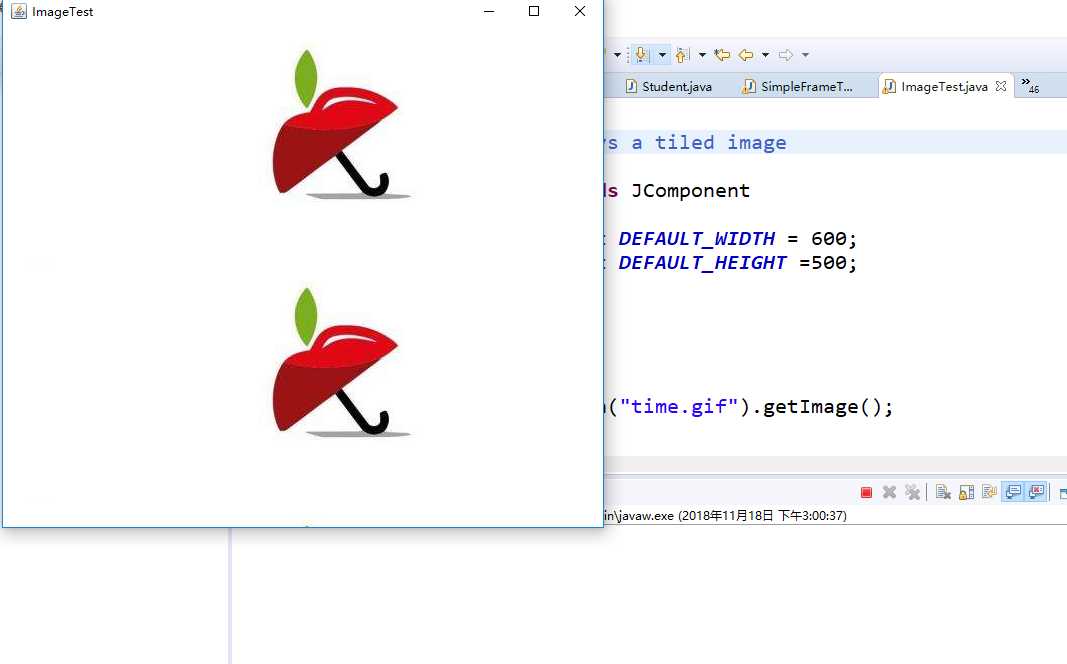
第三部分 实验总结
本章主要学习内容是图形程序设计,相比前面呢几章。本章内容算是我自己认真学习了的一章。所以对于本章的内容也有了一定程度的了解,当然了,相比于前面的本章的作业也是相对简单,所以整个作业的完成过程也是相对轻松的。
201771010124 王海珍 《面向对象设计 Java》第十二周总结
标签:hello 依赖 ica asc splay 类的方法 corn 实验 red
原文地址:https://www.cnblogs.com/www-whz-1997/p/9965518.html